Opening Industrial Catalysis Lab TU Delft
On 20 November 2019, TU Delft will open the Industrial Catalysis Lab, a new high-tech facility that makes it possible to carry out experiments under high pressure and at high temperatures. The lab forms a bridge between industry and the academic world, where experiments are usually carried out under lower pressure and at lower temperatures. In this building, researchers led by a new professor will develop innovations in the field of catalysis. Catalysis is a technology that accelerates chemical reactions and that forms the basis for many of our plastics, fuels and fertilizers.
The new professor at TU Delft, a Japanese scientist named Atsushi Urakawa, has extensive experience in developing new catalytic processes and materials. He comes from the Institut Català d'Investigació Química in Spain, where he was group leader since 2010. Delft is not unknown to him: he did his master's degree in Chemical Engineering there. Urakawa takes over from Professor Freek Kapteijn, who was in charge of the Catalysis Engineering section for many years.
Accelerating sustainability
After the opening of the Industrial Catalysis Lab, Atsushi Urakawa will give his inaugural address, 'Catalysing Innovation and Sustainability', in the auditorium of TU Delft. In his speech, he wants to emphasize that inventions that are made in the lab should be brought to the industry much faster. "Normally, it takes at least twenty to thirty years before an innovation conceived at a university is implemented in industrial processes," says Urakawa. "Given the speed at which our climate is changing, this is far too slow. We don't have the luxury of taking so long to make the production of our most important chemicals more sustainable," says Urakawa.
Black box
Urakawa has a vision on how to do better. An important scientific challenge, according to him, is that catalytic processes are still largely a black box. We know they work and by turning different knobs we can improve existing processes. But much of what happens in a reactor is unknown. "We now have the technological capabilities to find out exactly what happens during the different steps in such a process," says Urakawa. "And if we understand that, we can rationally design new catalytic processes."
Collaboration
A second challenge is to strengthen cooperation between academia and industry. By forming a community of people working towards the sustainability of chemical processes, Urakawa expects to be able to bring innovations to industry more quickly. The opening of the Industrial Catalysis Lab will therefore be accompanied by a symposium at which experts from Siemens, Shell and the University of Groningen, among others, will talk about the latest insights in the field of catalysis.
***
Location: Industrial Catalysis Lab, Kluyverweg 4, 2629 HT Delft.
Please refer to this page for a detailed programme.

